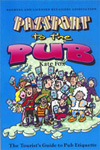Passport to the Pub:
A guide to British pub etiquette
Introduction
Q. Why should I go to pubs?
A. By all means visit Stonehenge and Buckingham Palace, but if you want to see what real life in Britain is all about, you have to go to the pub. Pub-going is by far the most popular native pastime. The 61,000 pubs in Britain have over 25 million loyal customers. Over three-quarters of the adult population go to pubs, and over a third are ‘regulars’, visiting the pub at least once a week. The pub is a central part of British life and culture. If you haven’t been to a pub, you haven’t seen Britain.
Visitors to Britain are bewitched by our pubs, but they are often bothered and bewildered by the unwritten rules of pub etiquette. This is not surprising: the variety and complexity of pub customs and rituals can be equally daunting for inexperienced British pubgoers.
Even at the very simplest level, ignorance of the rules can cause problems - such as unsatisfied thirst. Gasping for a beer, the innocent tourists go into a pub, sit down and wait for someone to serve them. (see Chapter 1). The more complex aspects of pub etiquette - the intricate behaviour-codes governing every moment from "what’s yours?" to "time, ladies and gentlemen" - are an infinite source of misunderstanding, confusion and potential embarrassment.
Experienced native pubgoers obey the unspoken rules, but without being conscious of doing so. Regulars will mutter and grumble when an uninitiated tourist commits a breach of pub etiquette, but may well be unable to tell him exactly what rule he has broken. Just as native speakers can rarely explain the grammatical rules of their own language, those who are most fluent in particular rituals, customs and traditions generally lack the detachment necessary to explain the ‘grammar’ of these practices in an intelligible manner. This is why we have anthropologists.
Most anthropologists go off to remote parts of the world to live among exotic tribes, observe their behaviour and ask endless questions in order to understand and explain their strange customs. In 1992, the BLRA asked the experienced social scientists at SIRC to apply the same research techniques in the British pub. Some of SIRC’s findings were published in Pubwatching with Desmond Morris (1993) and its sequel Women in Pubs (1994). In 1995, for Passport to the Pub, the SIRC Research team - led by Research Manager Joe McCann and Senior Researcher John Middleton - embarked on yet another six-month anthropological pub-crawl. In total, the research on which this book is based has involved observation work in over 800 pubs, consultations with over 500 publicans and bar staff and interviews with over 1000 pubgoers - both natives and tourists.
Our first task in the preliminary research for this project was to find out how much tourists knew about pub etiquette. Not surprisingly, given the lack of information available, we found that what tourists didn’t know about pub etiquette would fill a book. This is the book.
 Go to next section
Go to next section

